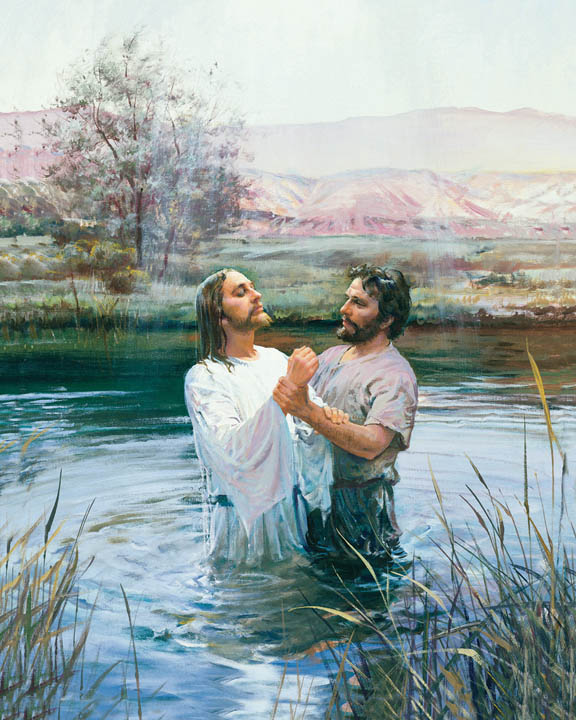When Jesus was prepared to begin his ministry, He approached His cousin, John the Baptist, who was baptizing in the Jordon River. John protested, stating that it would be more appropriate for Jesus to baptize John. He knew that baptism was for the remission of sins and Jesus Christ, being the Son of God, was sinless. However, Jesus persisted. Baptism is a commandment and Jesus always kept the commandments. He was baptized and at that event, God the Father bore testimony that Jesus was the Christ and that God was pleased with Him. The Holy Ghost appeared in the form of a dove.
 There is no question, given Jesus’ insistence on being baptized and God’s rare appearance (by voice) at the event, that baptism is an essential part of our religious life.
There is no question, given Jesus’ insistence on being baptized and God’s rare appearance (by voice) at the event, that baptism is an essential part of our religious life.
The Bible teaches that salvation requires baptism:
Jesus answered, Verily, verily, I say unto thee, Except a man be born of water and of the Spirit, he cannot enter into the kingdom of God (John 3:5).
And he commanded them to be baptized in the name of the Lord. (Acts 10:48)
Then Peter said unto them, Repent, and be baptized every one of you in the name of Jesus Christ for the remission of sins, and ye shall receive the gift of the Holy Ghost (Acts 2:38).
Mormons baptize in the same way John the Baptist baptized the Savior. The Bible records that Jesus came up out of the water, which means he was baptized by immersion. They baptize children at the age of accountability, which they deem to be age eight. By that time, a child who has been properly taught will know how to differentiate between right and wrong in most settings. If a child has not been taught, God holds the parents accountable.
To prepare children for baptism, both parents and the Church work together. Parents have the primary responsibility for their children’s spiritual growth, but the church provides support. Children begin attending church classes at eighteen months, beginning with a nursery that includes a small lesson and music time. At age three, they begin regular classes in the Primary children’s auxiliary. They study the scriptures and learn how to live as Jesus taught.
At home, the children have personal and family prayers. They read the scriptures as a family and children who can read begin to read the scriptures on their own. Each week, usually on Mondays, the family gathers for Family Home Evening, where they have prayers, hymns, a brief lesson on a gospel topic, games and treats. This is a personal, family-only church meeting held at home. It allows the parents to share their values and beliefs with their children.
Mormons have great faith in their children. They believe that if you work hard to train a child he or she will be ready to be baptized at age eight. Even young children are taught they must gain their own testimony of Jesus Christ and of the Church. They learn how to pray to know if the Church is true and how to recognize answers to prayers. It is expected they will pray about this prior to being baptized. Before being baptized, they are interviewed by their bishop (lay pastor) to find out if they have a testimony and if they are doing a reasonable job of keeping the basic commandments. Their leaders, teachers, and parents all work to make sure they have as much knowledge and readiness as an adult convert would have. Their church lessons include all the information adults would have at an appropriate level for their age.
Children who die before age eight are considered to be covered by the atonement of Jesus Christ. They are not accountable for their sins, and therefore, cannot sin. They can only make mistakes. A child who dies before eight goes directly home to God.
The purpose of baptism is to cleanse us of our sins and allow us a fresh start in our new lives as Christians. It is also a time to covenant with God. We take His name on us and covenant (promise) to honor it by living a true Christian lifestyle. It symbolizes birth and is, in fact a rebirth. It is a wonderful gift from Heavenly Father which makes it possible for us to return home to Him.
